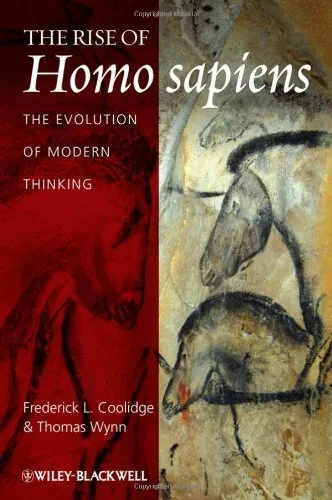The Rise of Homo sapiens: The Evolution of Modern Thinking
4.5
Reviews from our users

You Can Ask your questions from this book's AI after Login
Each download or ask from book AI costs 2 points. To earn more free points, please visit the Points Guide Page and complete some valuable actions.Introduction to "The Rise of Homo sapiens: The Evolution of Modern Thinking"
"The Rise of Homo sapiens: The Evolution of Modern Thinking" by Frederick L. Coolidge and Thomas Wynn is a seminal exploration of the cognitive journey that brought our species to its present intellectual and social heights. At its core, the book dives deep into what makes Homo sapiens unique, charting the evolutionary progression of our minds from ancestral beginnings to the modern day. By blending paleoanthropology, cognitive psychology, and archaeology, Coolidge and Wynn offer a nuanced perspective on human cognition, culture, and its intertwined development across millennia.
Detailed Summary of the Book
The book begins by examining early Homo species, such as Homo habilis and Homo erectus, and investigates their cognitive capabilities. The authors explore evidence from ancient tools, dwellings, and burial sites, painstakingly piecing together clues about thinking patterns, problem-solving abilities, and social structures. As the narrative progresses, the leap to Homo sapiens is carefully dissected, focusing on critical behaviors like symbolic thinking, language, creativity, and abstract reasoning.
"The Rise of Homo sapiens" articulates how cognitive innovations—like working memory, mental time travel, and self-awareness—laid the groundwork for art, religion, science, politics, and other hallmarks of humanity. Coolidge and Wynn also delve into the implications of evolutionary changes in the brain structure and functioning, emphasizing the central role of the prefrontal cortex in decision-making and social interaction. The book identifies pivotal milestones, such as the use of symbols and development of language, that allowed Homo sapiens to dominate both the physical and cognitive landscapes of Earth.
Ultimately, this thought-provoking volume contextualizes humanity's distinct cognitive fingerprint while addressing the philosophical questions of what it truly means to be "modern" and "human." Readers are taken on a captivating journey that explains not only how we think but why certain aspects of thinking evolved, offering fresh insights into our species' intellectual heritage.
Key Takeaways
- The evolution of Homo sapiens involved gradual but significant development of cognitive and social capacities.
- Symbolic thought, abstract reasoning, and language are central features that distinguish Homo sapiens from other species.
- Brain structure reorganization, particularly in the neocortex and prefrontal areas, played a crucial role in cognitive advancements.
- Working memory and episodic foresight (mental time travel) were evolutionary milestones that allowed humans to plan, create, and innovate.
- Culture and cognition co-evolved, resulting in the complex societies and technologies seen today.
These takeaways illuminate the intricate processes behind human cognitive evolution, helping modern readers appreciate the legacy of mental ingenuity passed down by our ancestors.
Famous Quotes from the Book
"From hand axes to hashtags, the story of cognition is one of adaptation and innovation."
"Modern thinking is not a sudden invention but the outcome of millions of years of experimentation and refinement."
"To understand ourselves, we must first understand the minds of those who came before us."
Why This Book Matters
This book is more than an academic exploration of our species' evolution; it is a vital resource for understanding the deep history behind how we think, act, and empathize. In an age where artificial intelligence and technology dominate discussions about cognition, "The Rise of Homo sapiens" reminds us of the organic roots and adaptive journey of human intelligence. It provides a comprehensive lens for studying our uniqueness in the animal kingdom while grounding insights in robust scientific evidence.
For students, researchers, and enthusiasts alike, this book serves as a profound reminder that the ability to innovate and connect socially is a testament to our evolutionary heritage. It inspires readers to reflect on their own cognitive capacities, cultural contexts, and the responsibilities inherent in possessing such remarkable minds. Ultimately, this book matters because it bridges the ancient past with the modern present, highlighting the importance of understanding who we are to shape the future of Homo sapiens.
Free Direct Download
You Can Download this book after Login
Accessing books through legal platforms and public libraries not only supports the rights of authors and publishers but also contributes to the sustainability of reading culture. Before downloading, please take a moment to consider these options.
Find this book on other platforms:
WorldCat helps you find books in libraries worldwide.
See ratings, reviews, and discussions on Goodreads.
Find and buy rare or used books on AbeBooks.


